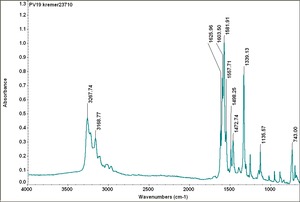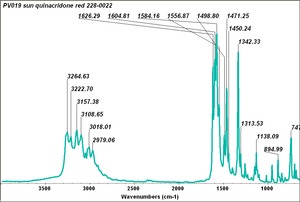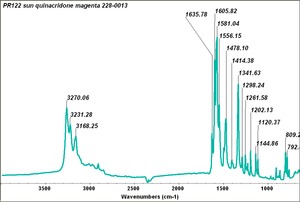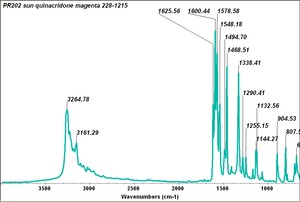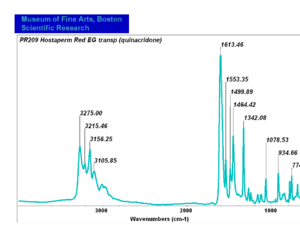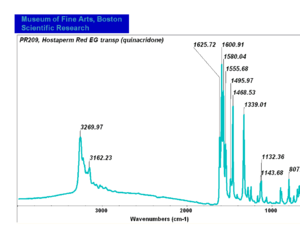Difference between revisions of "Quinacridone dye"
Jump to navigation
Jump to search
| (17 intermediate revisions by one other user not shown) | |||
| Line 3: | Line 3: | ||
A series of synthetic red and violet dyes composed of linear quinacridones that are made from terephthalic acid. Quinacridone dyes can exist in four crystalline allotropes, two of which are sold as red and violet pigments. Although synthesized in 1896, quinacridone colors were first recognized as useful pigments by W. Struve at DuPont in 1955 and marketed in 1958 under the name Monastral. These lightfast colorants are used in paints, printing inks, and plastics. | A series of synthetic red and violet dyes composed of linear quinacridones that are made from terephthalic acid. Quinacridone dyes can exist in four crystalline allotropes, two of which are sold as red and violet pigments. Although synthesized in 1896, quinacridone colors were first recognized as useful pigments by W. Struve at DuPont in 1955 and marketed in 1958 under the name Monastral. These lightfast colorants are used in paints, printing inks, and plastics. | ||
| − | [[[SliderGallery rightalign|PV19 | + | [[[SliderGallery rightalign|PV19 kremer23710.TIF~FTIR PV19(MFA)|PV019 sun quinacridone red 228-0022.TIF~FTIR PV19(MFA)|PR122 sun quinacridone magenta 228-0013.TIF~FTIR PR122(MFA)|PR202 sun quinacridone magenta 228-1215.TIF~FTIR PR202(MFA)|PR209 Hostaperm Red.PNG~FTIR PR209(MFA)|PR209 Hostaperm Red EG (Tate).PNG~FTIR TatePR209(MFA)]]] |
== Synonyms and Related Terms == | == Synonyms and Related Terms == | ||
| Line 10: | Line 10: | ||
Examples include: | Examples include: | ||
| − | + | * Red - Monastral red [DuPont]; Acra red [Liquitex]; Acra crimson [Binney and Smith]; Bocour red [Bocour Artist Colors];Thalo Red Rose | |
| − | Red - Monastral red [DuPont; Acra red [Liquitex]; Acra crimson [Binney and Smith]; Bocour red [Bocour Artist Colors];Thalo Red Rose | + | * Violet - Monastral violet, Pigment Violet 19; CI 46500; |
| − | |||
| − | Violet - Monastral violet, Pigment Violet 19; CI 46500; | ||
== Comparisons == | == Comparisons == | ||
| − | |||
| − | |||
{| class="wikitable" | {| class="wikitable" | ||
| + | ! Pigment number !! Manufacture !! Pigment name !! Manufacture CI number !! Comments | ||
|- | |- | ||
| − | |||
|- | |- | ||
| − | | PV019|| | + | | PV019 || Kremer|| unspecified || 23700 || |
|- | |- | ||
| − | | PV019|| | + | | PV019 || Kremer|| unspecified || 23710 || same as PV019 Sun quinacradone violet 228-1119 |
|- | |- | ||
| − | | PV019 || Kremer|| unspecified || | + | | PV019|| Sun || quinacradone red|| 228-0022 || |
| + | |- | ||
| + | | PV019|| Sun || quinacradone violet || 228-1119 || same as PV019 Kremer 23710 | ||
| + | |- | ||
| + | | PR122|| Sun || quinacradone magenta || 228-0013 || same as PR122 Kremer 23152 | ||
| + | |- | ||
| + | | PV122 || Kremer|| unspecified || 23152 || same as PR122 Sun 228-0013 | ||
| + | |- | ||
| + | | PR202|| Sun || quinacradone magenta || 228-1215 || | ||
| + | |- | ||
| + | | PR202|| unknown|| cinquasia magenta RT-343-D|| unknown || from Tate Collection | ||
| + | |- | ||
| + | | PR209|| unknown || hostaperm red EG transparent (quinacradone) || unknown|| spectrum does not match Tate PR209 | ||
|- | |- | ||
| + | | PR209|| unknown || hostaperm red EG transparent (quinacradone) || sample from the Tate Collection|| spectrum does not match other PR209 | ||
| | | | ||
| − | |||
|} | |} | ||
| − | == | + | ==Physical and Chemical Properties== |
Resistant to alkalis and heat. | Resistant to alkalis and heat. | ||
| Line 41: | Line 49: | ||
|- | |- | ||
! scope="row"| Density | ! scope="row"| Density | ||
| − | | 1.5 | + | | 1.5 g/ml |
|- | |- | ||
! scope="row"| Refractive Index | ! scope="row"| Refractive Index | ||
| Line 47: | Line 55: | ||
|} | |} | ||
| − | == | + | ==Resources and Citations== |
* R. J. Gettens, G.L. Stout, ''Painting Materials, A Short Encyclopaedia'', Dover Publications, New York, 1966 | * R. J. Gettens, G.L. Stout, ''Painting Materials, A Short Encyclopaedia'', Dover Publications, New York, 1966 | ||
| Line 63: | Line 71: | ||
* Monona Rossol, ''The Artist's Complete Health and Safety Guide'', Allworth Press, New York, 1994 | * Monona Rossol, ''The Artist's Complete Health and Safety Guide'', Allworth Press, New York, 1994 | ||
| − | * ''Encyclopedia Britannica'', http://www.britannica.com Comment: "chemical compound." | + | * ''Encyclopedia Britannica'', http://www.britannica.com Comment: "chemical compound." Accessed 7 Apr. 2005 . |
| − | * Art and Architecture Thesaurus Online, | + | * Art and Architecture Thesaurus Online, https://www.getty.edu/research/tools/vocabulary/aat/, J. Paul Getty Trust, Los Angeles, 2000 |
| − | * Website | + | * Website: www.handprint.com |
[[Category:Materials database]] | [[Category:Materials database]] | ||
Latest revision as of 13:36, 20 July 2022
Description
A series of synthetic red and violet dyes composed of linear quinacridones that are made from terephthalic acid. Quinacridone dyes can exist in four crystalline allotropes, two of which are sold as red and violet pigments. Although synthesized in 1896, quinacridone colors were first recognized as useful pigments by W. Struve at DuPont in 1955 and marketed in 1958 under the name Monastral. These lightfast colorants are used in paints, printing inks, and plastics.
Synonyms and Related Terms
colorante de quinacridona (Esp.)
Examples include:
- Red - Monastral red [DuPont]; Acra red [Liquitex]; Acra crimson [Binney and Smith]; Bocour red [Bocour Artist Colors];Thalo Red Rose
- Violet - Monastral violet, Pigment Violet 19; CI 46500;
Comparisons
| Pigment number | Manufacture | Pigment name | Manufacture CI number | Comments | |
|---|---|---|---|---|---|
| PV019 | Kremer | unspecified | 23700 | ||
| PV019 | Kremer | unspecified | 23710 | same as PV019 Sun quinacradone violet 228-1119 | |
| PV019 | Sun | quinacradone red | 228-0022 | ||
| PV019 | Sun | quinacradone violet | 228-1119 | same as PV019 Kremer 23710 | |
| PR122 | Sun | quinacradone magenta | 228-0013 | same as PR122 Kremer 23152 | |
| PV122 | Kremer | unspecified | 23152 | same as PR122 Sun 228-0013 | |
| PR202 | Sun | quinacradone magenta | 228-1215 | ||
| PR202 | unknown | cinquasia magenta RT-343-D | unknown | from Tate Collection | |
| PR209 | unknown | hostaperm red EG transparent (quinacradone) | unknown | spectrum does not match Tate PR209 | |
| PR209 | unknown | hostaperm red EG transparent (quinacradone) | sample from the Tate Collection | spectrum does not match other PR209 |
Physical and Chemical Properties
Resistant to alkalis and heat.
| Composition | violet- C20H12N2O2 |
|---|---|
| Density | 1.5 g/ml |
| Refractive Index | 2.02 - 2.04 |
Resources and Citations
- R. J. Gettens, G.L. Stout, Painting Materials, A Short Encyclopaedia, Dover Publications, New York, 1966
- G.S.Brady, Materials Handbook, McGraw-Hill Book Co., New York, 1971 Comment: p. 611
- Reed Kay, The Painter's Guide To Studio Methods and Materials, Prentice-Hall, Inc., Englewood Cliffs, NJ, 1983
- Ralph Mayer, A Dictionary of Art Terms and Techniques, Harper and Row Publishers, New York, 1969 (also 1945 printing)
- Richard S. Lewis, Hawley's Condensed Chemical Dictionary, Van Nostrand Reinhold, New York, 10th ed., 1993
- Hermann Kuhn, Conservation and Restoration of Works of Art and Antiquities, Butterworths, London, 1986
- Monona Rossol, The Artist's Complete Health and Safety Guide, Allworth Press, New York, 1994
- Encyclopedia Britannica, http://www.britannica.com Comment: "chemical compound." Accessed 7 Apr. 2005 .
- Art and Architecture Thesaurus Online, https://www.getty.edu/research/tools/vocabulary/aat/, J. Paul Getty Trust, Los Angeles, 2000
- Website: www.handprint.com
